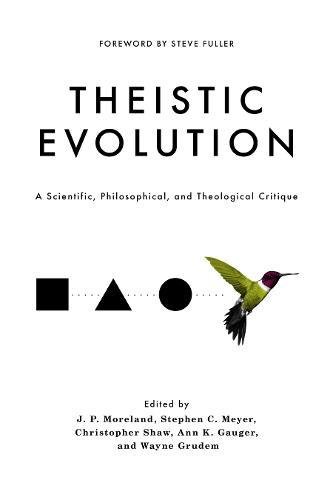Reviewed by Stephen West
This massive volume—it contains just a shade over 1000 pages—subjects the concept of theistic evolution to detailed scrutiny. It is divided into three parts: 1. The Scientific Critique of Theistic Evolution; 2. The Philosophical Critique of Theistic Evolution, and; 3. The Biblical and Theological Critique of Theistic Evolution. All told, these three parts contain a total of 31 chapters on a variety of both general and highly specialized topics. Although not every chapter is equally good in terms of its presentation of data, logical analysis, and literary merit, on the whole the volume is fairly uniform—which is no easy task, given its size, variety, and complexity. A detailed review of Theistic Evolution would require bringing together a team of reviewers with specializations that align with the scientific, philosophical, biblical, and theological content of the book. Doubtless there are areas where specialists would demur with some of the proffered analysis and interpretation. It would be a rare individual who could pick up this book with the necessary knowledge to analyze every page with equal competency. This reviewer certainly doesn’t confess having that kind of competence! So rather than attempting to offer a professional opinion on every section, let me offer some reasons why this book is worth reading, even for the non-specialist.
- Theistic Evolution is specialized in places, but is not written with too much technical jargon. This allows a general reader to follow the general train of thought, whereas specialists can track the author’s argument in greater detail. There are also some very helpful general sections and introductions which nicely lay out the issues and provide a framework on which to hang particular details and arguments. The design is therefore user-friendly, without sacrificing depth.
- A thoughtful reading of this book can engender humility. There is much that we don’t know or understand about the world. As individuals, we are quite ignorant about many fields. This may be especially important for pastors to remember: much harm has been done by pastors who are not scientists but who pontificate as if they are scientific experts. Often they completely misrepresent the scientific position they are attacking. For thoughtful and educated listeners, this destroys credibility. Pastors and teachers ought to preach the Bible, and if they do not understand science, they ought not to pretend that they do. An honest reading of this text will help many people realize how little they actually know in some of these areas!
- This book doesn’t caricature scientific theories, nor does it set up strawmen (unlike a lot of popular evangelical attacks on evolutionary theory). It maintains a properly nuanced understanding of the variety of ways in which the term evolution is used. This is helpful to remember. Even theistic evolution can mean different things to different people. It is important to understand how people are defining their terms.
- It shows that there are scientific challenges to abiogenesis and macroevolution. Without overstating the level of acceptance that these challenges have in the broader scientific community, they do exist. Furthermore, they are also endorsed by some materialist scientists and philosophers. Christians need not be afraid of science; in fact, we should embrace it.
- Data must be interpreted. When it comes to a philosophical critique, it is helpful to remember that facts are not ultimately interpreted outside of worldviews. “Science” has too often been defined in ways that are inimical to the idea that there is a Creator. God has been excluded by fiat before the investigation has started. This book does an excellent job at probing the philosophical complexities of these issues.
- The book does not take a militant stand on the age of the earth. It is recognized that many will find this a flaw rather than a strength, but in my opinion this is refreshing. Christians have bigger fish to fry, and this book keeps its focus on the main issues without unnecessarily alienating others.
- God’s Word is placed at the top of the epistemological hierarchy, yet it is recognized that Scripture requires interpretation. It is difficult to harmonize theistic evolution with the theology of the canon and with various biblical passages.
- There is enough in this book to interest almost anyone who is a serious reader. For some it will be the science; for others the philosophy. Others will gravitate towards the biblical and theological critique. Still, some may be more interested in what C. S. Lewis or B. B. Warfield actually thought about evolution. (I recall reading the collected letters of Lewis a few years ago and finding myself struck by the fact that what I had heard about him in terms of accepting evolutionary theory was only part of the story.) There is something for everyone.
In the end, this is a serious book about a serious issue. Not every reader will understand everything in the book, and certainly not every reader will agree with everything said in its pages. But it is well-worth reading for anyone interested in this subject. There is both breadth and depth between these covers. The younger generation is pressed with regard to evolution; we all need to be better informed. Theistic Evolution is a good tool and resource in this regard.
Stephen West is Lead Pastor at Crestwicke Baptist Church in Guelph, Ontario, and Adjunct Professor of Apologetics at Toronto Baptist Seminary.
